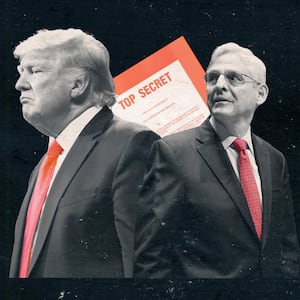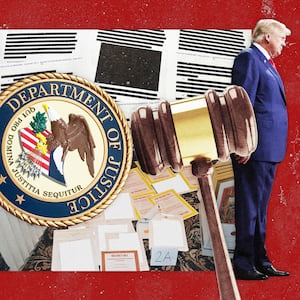Attorney General Merrick Garland and the Department of Justice need to discard the so-called “60-Day Rule” that supposedly would forbid bringing potential criminal charges against former President Donald Trump within 60 days of the upcoming midterms.
To start with, Garland and the DOJ need to tell the American public that no such rule exists. That’s right—the rule doesn’t exist. It’s the DOJ’s equivalent of an urban myth. No actual law or written policy at the DOJ mentions anything about not doing anything within 60 days of anything vis-à-vis criminal charges, involving elections.
This is no secret. Commentators including Just Security, Lawfare, and Jeffrey Toobin, plus the DOJ Office of Inspector General have all confirmed the absence of any such written rule and agreed that it’s actually more like an informal policy of prosecutorial best practices that includes avoiding actions such as “public indictments or other overt disclosures that could affect [elections].”
But the power and influence of the myth remains pervasive. Former Attorney General Eric Holder referenced the rule in his op-ed criticizing former FBI Director James Comey for having violated DOJ rules and norms in his announcement about the Hillary Clinton investigation less than a month before the election she lost to Trump. The instance of Independent Counsel Lawrence Walsh’s Iran-Contra indictments coming days before the 1992 presidential election in which the senior Bush lost to Bill Clinton is also often cited as a “violation that proves the rule.”
One actual written best-practices source (albeit missing any mention of 60 days) may arise from the DOJ Manual (what used to be known as the U.S. Attorney’s Manual) section 9-85-500 (Actions that May Have an Impact on an Election) which sets forth what we would hope is commonsense guidance requiring that prosecutors and agents may never “select the timing of any action”—which includes investigations, criminal charges statements—with the purpose of affecting elections or helping or hurting particular candidates or parties.
Memorandums like Holder’s 2012 guidance memorandum, which utilizes this same language, appear to imbue that principle as well.
There is good reason why none of those written materials impose a deadline of 60 days or any other period of time as being too close to an election. Any such deadline is completely arbitrary and unfounded in anything besides gut instinct. Who is to say that an indictment coming 65 days before an election is any different than one coming 30 days before? More importantly, the rule lacks any utility as an anti-corruption practice because no buffer zone of time can possibly remedy or prevent the damage done by a corrupt, politically motivated criminal prosecution intended to influence an election or hurt a particular candidate.
Of course, no ethical prosecutor needs such a rule because ethical prosecutors do not abuse their power and office by weaponizing criminal prosecution against political enemies. And whatever Attorney General Garland’s shortcomings may be, a lack of ethics is not among them.
So why would he and DOJ officials be agonizing over this mythic rule as some reporting)" href="https://urldefense.com/v3/__https://www.nytimes.com/2022/09/04/us/trump-investigations-midterm-elections.html__;!!LsXw!RJvP03NiM41HK0Mu1ZLzR2-QdiznZv0Kt5VVmRFeK8snpKyABFeb5PfdD6sfw6MJPHMxvqZwoqco4IVeEtG9yug$">some reporting indicates? The frustrating answer may be that Garland’s belief that a major part of his mission is to restore the DOJ’s image and reputation for being ethical and non-partisan, after it was left in tatters by the Trump administration.
It may make him want to adhere to the rule in an effort to avoid being criticized for being political but such adherence could stop him from pursuing potential crimes committed by Trump and his inner circle in a timely fashion when time is of the essence.
For example, the current criminal investigation into potential Espionage Act violations centered around the national defense documents recovered at Mar-a-Lago involves potential ongoing risks to U.S. national security and even possible danger to human sources. Investigating such a dangerous situation should not be put off until after the midterm elections.
Similarly, the efforts to deny legitimate election results and alleged interference with election processes need to be investigated and prosecuted yesterday given that those same illegal actions may be occurring right now and in the aftermath of the midterms. Indeed, all of the evidence uncovered publicly by the Jan. 6 Committee indicate that the threat to the stability of our democratic process has never been greater. It makes no sense to put off criminal investigations into threats to our very election processes until after the next election.
This is why DOJ needs to disavow the mythology of the “60-Day Rule” and simply follow the evidence and law. If they find evidence of criminal wrongdoing that they can prove beyond a reasonable doubt then they should bring the case immediately.
Fear of being accused of corrupt political motivations cannot be DOJ’s guiding star in the midst of unprecedented twin threats to national security and our elections. The possible dangers posed to our country by such threats is so grave that every delay may cause irreparable harm and the DOJ needs to understand that trying to avoid the appearance of looking political by doing nothing can end up being political.








